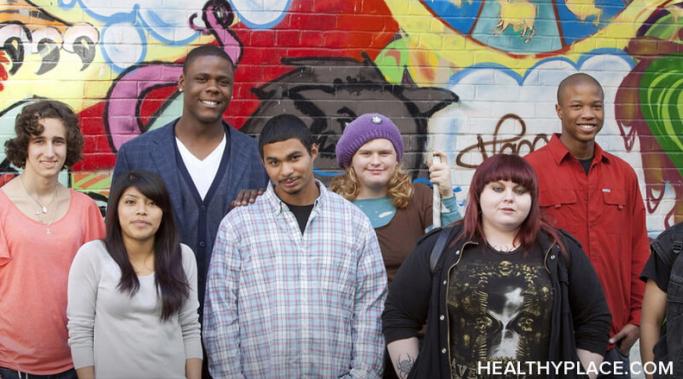Blogs
Should people with mental illness have the right to vote? Okay, yes, this is clickbait, largely because I can't use my swear words of choice here to ask the question I want to ask, which is "*Blasphemous expletive*, Indiana, should we be *expletive* having this *expletive* conversation in *expletive* 2016?" But apparently, in my state of Indiana, this is up for discussion. More specifically, a mental health consumer is asking if people who reside in state psychiatric hospitals should have the right to vote using the hospital as their address; and the state is saying "no," even though the consumer has done so in the past. So the question is, should people with mental illness have the right to vote?
After years of dealing with binge eating disorder my body image became damaged, but taking selfies helped my damaged body image. After believing my body was unacceptable and my eating was the direct cause of its shape and form, I had started a long campaign of self-hatred directed at my body. Now, I look at my body as capable of more than imperfection and taking selfies helped me with my body image journey.
Despite considerable effort by parents, professionals, and others to reduce stigma and enhance understanding of teen mental health issues, a troubling amount of misinformation remains (Youth And Mental Illness Stigma). This post is one humble attempt to dispel four unfortunately common stigmas about teens and their mental health.
In PTSD recovery, the freeze response can be difficult for some to understand. Have you ever been so terrified, that all you could do is freeze in your tracks, afraid, or even unable, to move? If so, you may have been experiencing the freeze response to fear, which is a common symptom of posttraumatic stress disorder (PTSD). The freeze response is a normal, physical response to extreme fear or trauma. However, if you are a trauma survivor who has been diagnosed with PTSD, the freeze response may not be serving you well. The physical response of freezing, feeling paralyzed, or feeling like you are out of your body (dissociation), can be triggered by events that are not at all life-threatening for those of us with PTSD (PTSD and the Freeze Response). In other words, our response doesn't fit the current situation. Dealing with the freeze response can be frustrating, but you can deal with the freeze response in PTSD recovery.
Do you know how to confront an animal hoarder? Animal hoarders keep their secret for as long as they possibly can, but, eventually, it becomes obvious that compassion has obscured reality and intervention becomes necessary (What Is Obsessive Compulsive And Related Disorders in DSM-5?). My mother fosters cats for a couple of Humane Societies in the Greater Indianapolis area. Sometimes, this involves confronting animal hoarders. There are certain techniques that help make the confrontation less stressful for all involved.
You can remain creative with anxiety, if, indeed, you are creative in the first place. I believe that it is high time that we as a society stamp out the rather offensive notion that mental illness is somehow linked in with creative thinking and originality. This cliché could, in fact, not be further from the truth (Mental Illness and Crazy: Creativity and Medication). Many great artists, musicians and writers produce exceptional works in spite of their mental illness, not because of it. I am not a genius and I don’t have any fantastically advanced talents to speak of. However, I have felt my own ability to be creative disintegrate during times when my anxiety has skyrocketed but I've also learned how to remain creative through anxiety.
Physical pain in bipolar disorder is one of the hardest bipolar symptoms to treat (and, of course, not everyone experiences this). The physical pain in bipolar disorder is known as neuropathic pain. Neuropathic pain is commonly associated with spinal cord injuries or amputation but can occur in psychiatric disorders and in other illnesses as well. This neuropathic pain, physical pain in bipolar disorder, can be debilitating but there are options for treatment.
People with schizophrenia or schizoaffective disorder have a much higher chance of having suicidal feelings and dying of suicide than the rest of the population. Knowing this, you would think the minute I had a suicidal thought, I’d go to the emergency room (What To Do If You Are Suicidal). But I’ve been to the psychiatric ward, and as useful as it can be in a time of real danger, I don’t want to end up there again. So what are some tactics people with schizophrenia or schizoaffective disorder can use when suicidal feelings, that don’t seem to require a trip to the emergency room, hit us?
Improving sobriety by healing resentments is the ultimate goal of revisiting painful memories. When we have successfully navigated our memories and emotions, we have the opportunity to let them go so that they no longer harm us. In order for old resentments to no longer hold power over us, we have to choose to forgive ourselves and the other person. You can heal resentments to improve your sobriety.
When you have an eating disorder which can make you gain weight, a lot of people assume weight los is the answer to binge eating disorder (BED). As if you reach your goal weight and then you're in recovery. However, it's not that simple. Weight loss isn't the answer to binge eating disorder.









